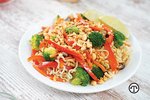

(NAPSI)—Life today often seems to be in overdrive, leading many Americans to make snack and meal decisions quickly without really thinking about the nutritional makeup of what they’re consuming—but it doesn’t have to be that way.
Think Twice
“Being mindful about what you eat each day can have a significant impact on so many aspects of your life. Food choices can influence your mood, energy level, cognition and memory, as well as your overall health and well-
being,” says Samara Sterling, Ph.D., director of research for The Peanut Institute.
Unfortunately, most “fast food” is overly processed and relies on sugar, salt and saturated fat to make it taste good in the moment, but it can end up having detrimental effects down the road and may even increase the risk for certain cancers.
Food As Medicine
Peanuts and peanut butter, on the other hand, are convenient and healthy superfood choices that satisfy immediate hunger while delivering lifelong benefits.
According to numerous research studies, regular consumption of peanuts has been shown to: reduce Alzheimer’s disease risk by 70%; reduce diabetes risk by 53% and cardiovascular disease risk by 13%; and aid memory, cognitive function and concentration. Daily consumption can even help reduce anxiety and depression.
“Peanuts deliver such a plethora of benefits. A single serving of peanuts, which is about a handful, is packed with 19 vitamins and minerals and contains seven grams of plant-based protein,” adds Sterling.
The Science
The benefits of plant-based protein are becoming more and more apparent. Research that compared nuts and legumes to animal protein showed higher intake from meat was associated with increased mortality risk. Another study found that replacing animal-based protein with plant-based protein can substantially lower the likelihood of developing diabetes. Finally, an interesting study of older adults found that faster walking speed was associated with a higher intake of plant protein, while slower walking speed was associated with greater animal protein intake.
To easily incorporate peanuts and peanut butter into a busy schedule, check out The Peanut Institute’s collection of simple yet tasty recipes.
Tasty Peanut Ramen
1 (3 oz.) package ramen
1 Tbsp shallot, diced
2 tsp minced garlic
1/2 cup shredded carrot
1/2 cup sliced mushrooms
1/2 cup coleslaw blend or chopped broccoli florets
1/2 cup red pepper, large dice
1/4 cup peanut butter
1/2 cup - 2/3 cup water
1 Tbsp soy sauce
1 Tbsp brown sugar
1 Tbsp Sriracha
1/4 cup roasted peanuts, chopped
1 Tbsp cilantro, for garnish
Cook ramen according to package directions. Strain noodles and set aside. In a medium sautée pan, warm 1 Tbsp of oil over medium high heat. Add shallot and garlic and cook until aromatic. Add mushrooms to pan, sautée until tender. Combine carrots, broccoli and red pepper into the pan and sautée about 2 minutes. Remove from the pan. Combine water, peanut butter, soy sauce, brown sugar and Sriracha in the pan. Simmer and reduce until sauce is thickened, about 2 minutes. Top ramen noodles with sauce and combine well. Top with vegetables, chopped peanuts, and cilantro.
Learn More
For other recipes and further information, visit www.peanutinstitute.com or follow The Peanut Institute on Instagram, Facebook or Twitter.
• The Peanut Institute is a non-profit organization supporting nutrition research and developing educational programs to encourage healthful lifestyles that include peanuts and peanut products. It pursues its mission through research programs, educational initiatives and the promotion of healthful lifestyles.